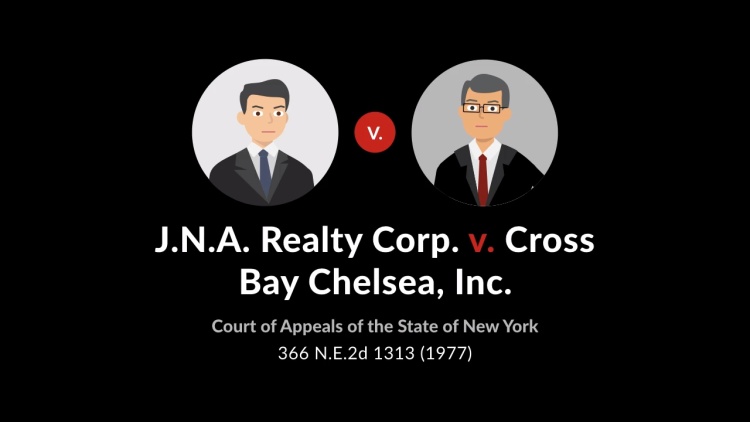J.N.A. Realty Corp. v. Cross Bay Chelsea, Inc.
New York Court of Appeals
366 N.E.2d 1313 (1977)
- Written by Angela Patrick, JD
Facts
J.N.A. Realty Corp. (JNA) (plaintiff) leased commercial property to a restaurant for a 10-year term, with an option to renew for another 10-year term. The lease required the restaurant to inform JNA at least six months prior to the end of the lease term if it wished to exercise the option. Cross Bay Chelsea, Inc. (Chelsea) (defendant) offered to buy the lease, under the condition that the option be modified to be a 24-year term. JNA agreed to modify the option term as requested. All other terms of the lease remained unchanged, including the six-months’-notice requirement. Chelsea purchased the lease, as well as some fixtures and chattels then existing on the property. Chelsea occupied the premises and made improvements to the property. Chelsea did not give notice before the deadline, later claiming it was unaware there was a deadline. After the deadline passed, JNA informed Chelsea that Chelsea needed to vacate the premises at the end of the lease term. Chelsea then provided notice of its intention to renew the lease, but JNA refused to renew the lease. After the lease expired, JNA brought a holdover action to recover the premises from Chelsea. The trial court held that Chelsea was entitled to equitable relief in the form of a lease renewal, and the appellate term affirmed. The appellate division reversed the judgment for Chelsea. Chelsea appealed to the New York Court of Appeals.
Rule of Law
Issue
Holding and Reasoning (Wachtler, J.)
Dissent (Breitel, C.J.)
What to do next…
Here's why 907,000 law students have relied on our case briefs:
- Written by law professors and practitioners, not other law students. 47,100 briefs, keyed to 996 casebooks. Top-notch customer support.
- The right amount of information, includes the facts, issues, rule of law, holding and reasoning, and any concurrences and dissents.
- Access in your classes, works on your mobile and tablet. Massive library of related video lessons and high quality multiple-choice questions.
- Easy to use, uniform format for every case brief. Written in plain English, not in legalese. Our briefs summarize and simplify; they don’t just repeat the court’s language.







